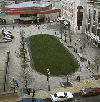PUBLIC ART IN SHEFFIELD
Lead
Artists: Paul and Sue Mason
Tudor Square artworks, 1991
Tudor Square
mixed media
This piece has now been destroyed as the Square is being redeveloped

Tudor Square, Sheffield S1. (A-Z p5 4F)
Description:
Stone carving
on the wall surrounding the centre of the square and Tree
grilles and Railings by Paul Mason.
Mosaics set
into the paving of the square by Sue Mason.
Boulsover Monument
by Richard Perry.
Commission:
Sheffield City Council, funded by J. G. Graves Charitable Trust.
[Update 2009] The Square has been destroyed and is under re-development, completion by Winter 2009. It is not known what has happened to the constituent parts of the Mason's artworks.
Comment:
"Tudor Square is a recent invention. It had been an unfocused open
space, oddly left between buildings of civic pride and purpose. The space
had long been used as a car park. Creation of a square was undertaken when
the city took stock of its image prior to the World Student Games in 1991.
It was conceived as an arts square. This focus was sensible as the space
opened up on all sides to buildings where performances, exhibitions, entertainment
took place. The restoration of the Lyceum Theatre was already under consideration.
Tudor Square is not a square in the sense of it being an open space of that
shape. It is actually a grassed oval which, on a sloping site, creates a
flat stage for performances, for displays, for strolling round. The oval
is bound by a low stone wall upon which a very intricately placed sequence
of marks are carved. Paul Mason, Lead Artist for the project, has said that
what was "fundamental to all the practices (in the area) was communication"
and that "mark making was fundamental to communication". This
became the aesthetic for the square. Marks by which man communicates are
found not only on the wall, but form the basis of the design for the tree
grilles and railings also in the square. Into the pavement Sue Mason has
also set a number of fluid marks. These mosaics were to help orientation
in the square. At the Graves Gallery end, a bronze memorial to Thomas Boulsover
was placed. Lastly, though invisible from the square, a stairwell of stained
glass was commissioned for the Lyceum.
"A plaque on the Central
Library building in the square directs attention to Tudor Square's distinctiveness.
'The stone wall, mosaics, railings and tree grilles celebrate early signs
and symbols of communication amongst people. From such marks all cultures
developed different alphabets and languages.' "
Text taken from 'Going Public' by Elizabeth Norman.

There was also an exhibition of preliminary sketches, studies and maquettes
at the Graves Art Gallery prior to the artworks being installed. More information
on the square given in City Council leaflets is available on a separate
page:
Council
Documents about Tudor Square